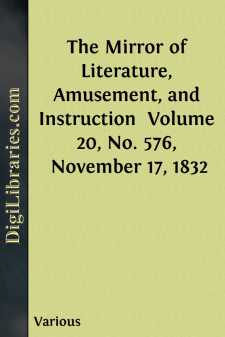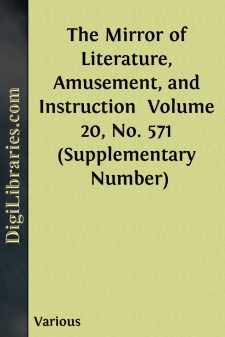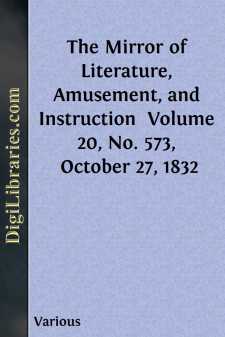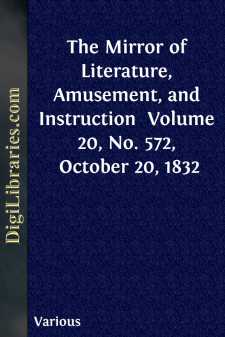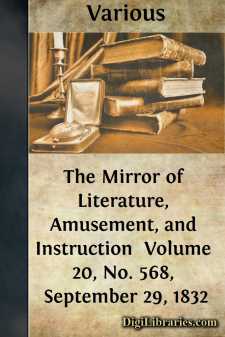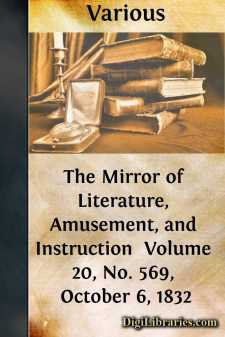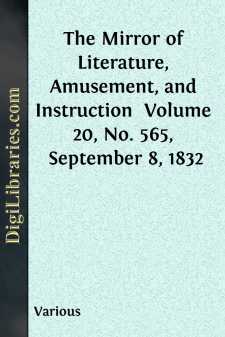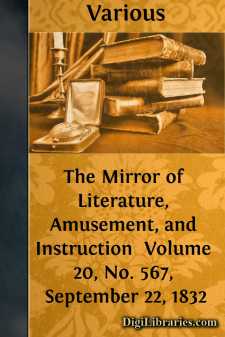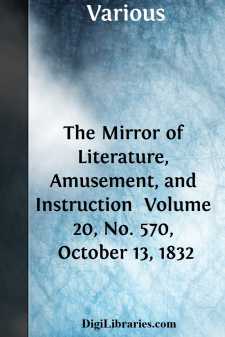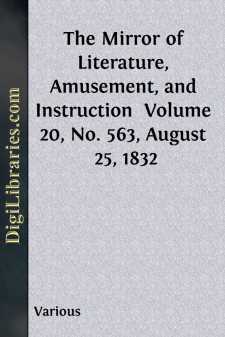Periodicals
- Art 27
- Children's periodicals 59
- Entertainment 5
- Food/Wine 2
- Games/Humor 455
- General 661
- Health 1
- History 53
- House/Home 1
- Regional 62
- Science/Nature 118
- Transportation 10
Periodicals Books
Sort by:
by:
Various
WINGFIELD MANOR-HOUSE. This interesting structure is referred to by a clever writer as one of the richest specimens extant of the highly-ornamented embattled mansions of the time of Henry VII. and VIII., the period of transition from the castle to the palace, and undoubtedly the best aera of English architecture. This judgment will be found confirmed in the writings of distinguished antiquarians; and...
more...
by:
Various
Sir Walter Scott was the third son of Walter Scott, Esq., Writer to the Signet, in Edinburgh, and Anne, daughter of Dr. John Rutherford, Professor of Medicine in the University of the above city. His ancestry numbers several distinguished persons; though the well-earned fame of Sir Walter Scott readers his pedigree comparatively uninteresting; inasmuch as it illustrates the saw of an olden poet, that...
more...
by:
Various
OLD HALL, IN DERBYSHIRE. This picturesque specimen of olden architecture stands upon the Norton Lees estate, on the northern verge of Derbyshire upon the adjacent county of York; about a mile from Sheffield, and eight miles north of Chesterfield, and but a short distance from Bolsover Castle, pictured in No. 566 of The Mirror. "The estate, in the reign of Henry VII., was the property of the family...
more...
by:
Various
BIRTHPLACE OF DR. JOHNSON, AT LICHFIELD. In the large corner house, on the right of the Engraving, SAMUEL JOHNSON was born on the 18th of September, N.S. 1709. We learn from Boswell, that the house was built by Johnson's father, and that the two fronts, towards Market and Broad Market-street stood upon waste land of the Corporation of Lichfield, under a forty years lease; this expired in 1767,...
more...
by:
Various
BIRTHPLACE OF THE EARL OF ELDON. Little need be said, by way of explanation, for the addition of the present subject to our collection of the birthplaces of eminent men. It is something to know that John Scott was born at Newcastle-upon-Tyne, in the principal dwelling represented in the above Engraving, in the year 1751; that he received the rudiments of his education at the free grammar-school of the...
more...
by:
Various
LISBON. LISBON. Lisbon, the capital of Portugal, was called by the ancients Ulyssippo, and the foundation is fabulously ascribed to Ulysses. The situation is grand, on the north bank of the river Tagus, in lat. 38° 42-1/3′ N., lon. 9° 8-1/3′ W. The harbour, or rather road, of Lisbon, is one of the finest in the world; and the quays are at once convenient and beautiful. On entering the river, and...
more...
by:
Various
PERSIAN BATH. The luxurious indulgence of baths in the East is generally known to the reader of travels, so as to render acceptable the following details. They are extracted from Mr. Buckingham's Travels, and bear all the graphic minuteness of his entertaining pen. The Bath is one of the principal ones of Kermanshah, an important frontier town of Persia. "It was entered by a porch, extremely...
more...
by:
Various
Public Buildings of Manchester PUBLIC BUILDINGS OF MANCHESTER. The annexed Engravings are important illustrations of the statement in a recent Edinburgh Review:—that Lancashire from being amongst the most backward parts of England, has worked its way into the front rank. They are, however, not only characteristic of the public spirit which animates the whole county; but they are monuments of...
more...
by:
Various
THE ISLE OF WIGHT.(Wilkes's Cottage.)NOTES FROM A PEDESTRIAN EXCURSION IN THE ISLAND. By a Correspondent. Although the roads of the island have within the last twenty years been rendered passable for vehicles of all kinds, even to stage coaches, yet by far the best mode of inspecting this English Arcadia is to travel through it on foot, commencing at Ryde. From this town a footpath leads across...
more...
by:
Various
(Beauchief Abbey.) Mr. Rhodes, the elegant topographer of the Peak, observes, "there are but few individuals in this country, possessing the means and the opportunities of travel, who have not, either from curiosity or some other motive, visited the Peak of Derbyshire." This remark is correct; and to it we may add, that the "few" who have not personally visited the Peak, have become...
more...


